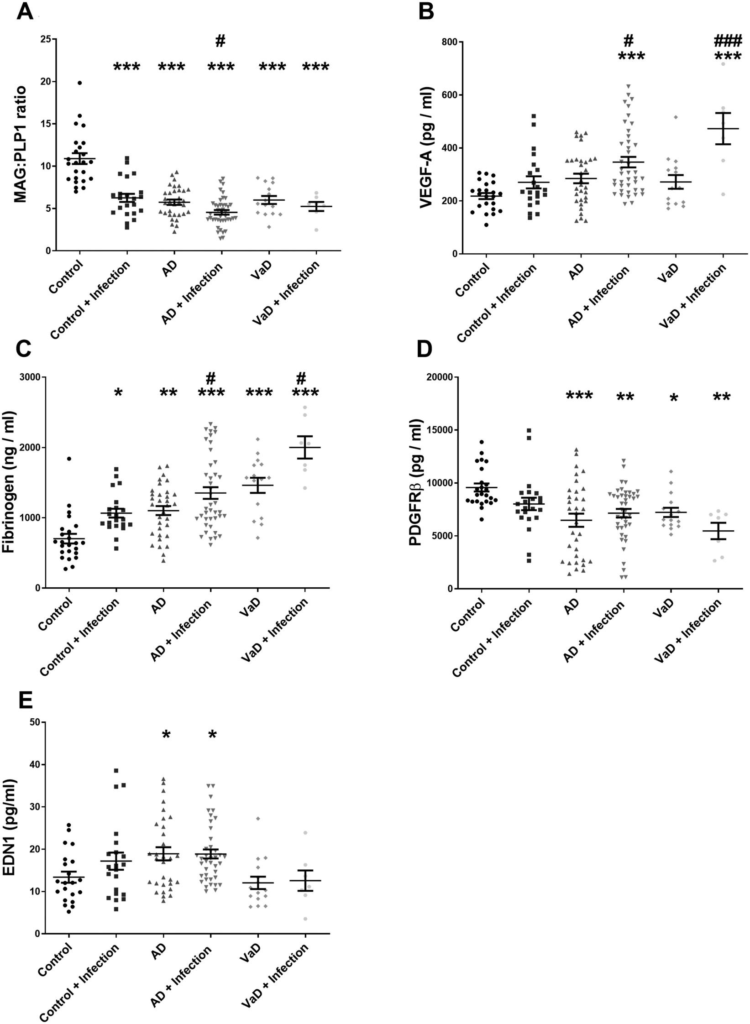FineTest Elisa kit contributes to the research on cognitive disorders and neurology. The immunoassay is designed to measure fibrinogen concentration in brain tissue homogenates.
Publication Details
Article Title: Systemic Infection Exacerbates Cerebrovascular Dysfunction in Alzheimer’s Disease
Journal Title: Brain
DOI: 10.1093/brain/awab094
IF: 13.501
PMID: 33723589
Abstract: We studied the effects of systemic infection on brain cytokine level and cerebral vascular function in Alzheimer's disease and vascular dementia, in superior temporal cortex (Brodmann area 22) from Alzheimer's disease patients (n = 75), vascular dementia patients (n = 22) and age-matched control subjects (n = 46), stratified according to the presence or absence of terminal systemic infection. Brain cytokine levels were measured using Mesoscale Discovery Multiplex Assays and markers of cerebrovascular function were assessed by ELISA. Multiple brain cytokines were elevated in Alzheimer's disease and vascular dementia: IL-15 and IL-17A were maximally elevated in end-stage Alzheimer's disease (Braak tangle stage V-VI) whereas IL-2, IL-5, IL12p40 and IL-16 were highest in intermediate Braak tangle stage III-IV disease. Several cytokines (IL-1β, IL-6, TNF-α, IL-8 and IL-15) were further raised in Alzheimer's disease with systemic infection. Cerebral hypoperfusion-indicated by decreased MAG:PLP1 and increased vascular endothelial growth factor-A (VEGF)-and blood-brain barrier leakiness, indicated by raised levels of fibrinogen, were exacerbated in Alzheimer's disease and vascular dementia patients, and also in non-dementia controls, with systemic infection. Amyloid-β42 level did not vary with infection or in association with brain cytokine levels. In controls, cortical perfusion declined with increasing IFN-γ, IL-2, IL-4, IL-6, IL-10, IL-12p70, IL-13 and tumour necrosis factor-α (TNF-α) but these relationships were lost with progression of Alzheimer's disease, and with infection (even in Braak stage 0-II brains). Cortical platelet-derived growth factor receptor-β (PDGFRβ), a pericyte marker, was reduced, and endothelin-1 (EDN1) level was increased in Alzheimer's disease; these were related to amyloid-β level and disease progression and only modestly affected by systemic infection. Our findings indicate that systemic infection alters brain cytokine levels and exacerbates cerebral hypoperfusion and blood-brain barrier leakiness associated with Alzheimer's disease and vascular dementia, independently of the level of insoluble amyloid-β, and highlight systemic infection as an important contributor to dementia, requiring early identification and treatment in the elderly population.
Keywords: Alzheimer’s Disease, Blood–brain Barrier, Cerebral Hypoperfusion, Neuroinflammation, Systemic Infection, Cognitive Disorders
Immunoassay
| FineTest Product | Sample | Detection Target | Species |
| Human FG(Fibrinogen) ELISA Kit (EH3057) | brain tissue homogenates | Fibrinogen | Human |
Validated Image

Figure Source: Brain, 2021 Jul 28;144(6):1869-1883. doi: 10.1093/brain/awab094.
Figure 2. Systemic infection and cerebrovascular dysfunction in Alzheimer’s disease and vascular dementia. Scatterplots showing levels of several markers of cerebrovascular function/dysfunction in the superior temporal cortex (BA22) in post-mortem brain tissue in Alzheimer’s disease (AD) and vascular dementia (VaD) in the absence or presence of terminal systemic infection. Each point represents the mean of duplicate measurements for an individual. Horizontal bars indicate the cohort mean ± SEM. *Significant compared to age-matched controls. #Significant in association with terminal systemic infection in the same diagnosis group. */#P < 0.05, **/##P < 0.01, ***/###P < 0.001.
